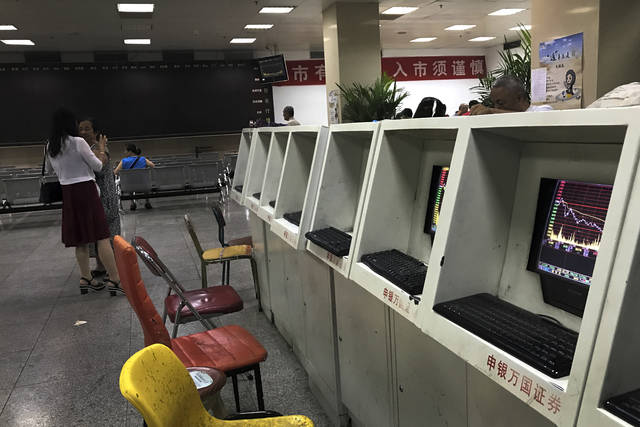China’s bravado belies worries over trade clashes with US

In this Thursday, July 5, 2018 photo, girls sit in front of an American cosmetics brand’s shop window display reading “Greetings from New York City” at a shopping mall in Beijing. In its official discourse, China says it’s girded for a trade war with the U.S. and can give as good as it gets. Elsewhere, the message is less sanguine. A decline in the stock market and expressions of concern among some academics point to an underlying anxiety over the trade friction that contradicts Beijing’s confident posture. (AP Photo/Mark Schiefelbein)

Investors chat near an electronic board which was turned off after China’s stock markets were closed at a brokerage house in Beijing, Thursday, July 5, 2018. In its official discourse, China says it’s girded for a trade war with the U.S. and can give as good as it gets. Elsewhere, the message is less sanguine. A decline in the stock market and expressions of concern among some academics point to an underlying anxiety over the trade friction that contradicts Beijing’s confident posture. Beijing has said if the U.S. follows through on its threat to impose 25 percent duties Friday on $34 billion in Chinese products, it will respond in kind. (AP Photo/Andy Wong)
BEIJING — China says it’s girded for a trade war with the U.S. and can give as good as it gets, but behind the official bravado lies a deep unease over trade friction with Washington.
BEIJING — China says it’s girded for a trade war with the U.S. and can give as good as it gets, but behind the official bravado lies a deep unease over trade friction with Washington.
“There are those who believe the U.S. must lose and China must win,” Li Xiao, a leading economics professor, said in a commencement speech last weekend at northern China’s Jilin University.
“I think this is wishful thinking that defies common sense,” Li said in remarks that circulated widely online this week, praised as a reality check as the world’s two largest economies stood ready to exchange tit-for-tat tariffs on tens of billions of dollars of each other’s goods starting Friday.
China has said it will fire back with corresponding tariffs if the U.S. follows through on its threat to impose 25 percent duties on $34 billion in Chinese products. All told, U.S. President Donald Trump has said he is prepared to levy higher taxes on up to $450 billion in Chinese imports, or nearly 90 percent of the goods China shipped to the United States last year.
Taking a defiant stance, the Chinese Commerce Ministry on Thursday rejected “threats and blackmail.”
“China will not bow in the face of threats and blackmail, nor will it be shaken in its resolve to defend global free trade,” said ministry spokesman Gao Feng at a news conference.
“China will never fire the first shot,” Gao said. “However, if the United States adopts taxation measures, China will be forced to fight back to defend the core interests of the nation and the interests of the people.”
The trade dispute has roiled the stock market, where the benchmark Shanghai Composite index has tumbled 12 percent in the past two weeks. Longer-term trends are a factor, but uncertainty over trade is taking a toll, analysts say.
Some prominent Chinese experts say Beijing may have underestimated the pain the U.S. tariffs could inflict on export manufacturers’ already razor-thin margins, and overplayed its hand.
“I strongly urge the Chinese government to fully estimate the negative impact of the trade war on the Chinese economy and adopt practical and pragmatic measures to avoid or mitigate a trade war,” Yu Zhi, a professor at Shanghai University of Finance and Economics, said in an interview.
The first stage of tariffs that target mostly Chinese technology exports may be manageable, Yu said, but if Trump imposes the full scope of tariffs he has threatened to use exporters will see their profits dwindle. That could lead to politically unpalatable job losses.
Chinese exporters of tools, lighting and appliances say U.S. orders have shrunk as customers wait to see what will happen to prices.
Ningbo Top East Technology Co., which makes soldering irons in Ningbo, south of Shanghai, used to export 30 percent of its output to the United States, according to its general manager, Tong Feibing. He said American orders have fallen 30 to 50 percent compared with a year ago.
The company wants customers to split the cost of the tariff hike, but few are willing, said Tong.
“There is a chance the company will lose money and might go bankrupt,” said Tong. “I will do whatever I can, including layoffs.”
The size of the Chinese trade surplus with the U.S. limits Beijing’s ability to inflict damage on American exports by a factor of almost three to one. China’s imports from the United States last year totaled $153.9 billion, well short of Trump’s $450 billion target.
But officials in Beijing say China is prepared to do what’s needed to safeguard its national interests. Editorials in the state-controlled media speak of the folly of the Trump administration’s attempt to extract concessions via higher tariffs, warning that will hurt U.S. economic interests while strengthening China’s domestic industries.
“Washington cannot contain China’s growth through a trade war,” read the headline of an editorial Thursday in the Global Times, a party newspaper.
“If the US is determined to escalate conflicts with China, then so be it. Perhaps the Trump administration can only clear its mind after a fight.”
In fighting back, China could impose onerous regulatory and bureaucratic hurdles on U.S. companies’ Chinese operations. Beijing has used such tactics in dustups with various countries, including South Korea, Australia and Norway.
The tariffs come at a time, however, of slowing growth and rising debt in China after more than three decades of nearly uninterrupted expansion.
“A hit to China’s exports would act as an additional drag on an economy that already shows signs of losing some growth momentum,” said Eswar Prasad, a professor of trade policy at Cornell University.
The economy held steady, expanding at a 6.8 percent annual pace during the first quarter of this year, but manufacturing activity shows signs of slowing. Even though exports contribute less than 1 percent of annual growth, they still support millions of manufacturing jobs.
Any dramatic decline in exports would pose a challenge for President Xi Jinping given that the ruling Communist Party’s claim to power is largely based on its ability to deliver improved living standards and uphold national prestige.
Chinese consumers and businesses will bear the brunt as prices rise thanks to higher tariffs.
For medical student Yang Di, higher tariffs could mean much higher costs for biomedical supplies from the U.S.
That would slow his research. “So, in general, it would have a great impact on China,” said Yang, a student at Shanghai’s Jiaotong University. “Even if you force domestic technology companies (to improve), it may take a while for them to adapt.”
Xi has vowed to guide China’s rise as a modern superpower in what he calls the “great rejuvenation of the Chinese nation” based on the state-led industrial policy that is at the heart of the trade and technology disputes with Washington.
He’s sure to steer clear of any obvious backtracking that might make him look weak.
Still, a trade war would likely distract from China’s efforts to expand its diplomatic, economic and military footprints abroad, notably through Xi’s signature “Belt and Road” involving $1 trillion in investments in infrastructure projects across Asia and beyond.
“An open trade war with the U.S., which now seems imminent, would put a damper on China’s push to straighten up its economy and to increase its global economic and geopolitical influence,” Prasad said.
———
Associated Press researchers Si Chen in Shanghai and Yu Bing in Beijing contributed to this report.

